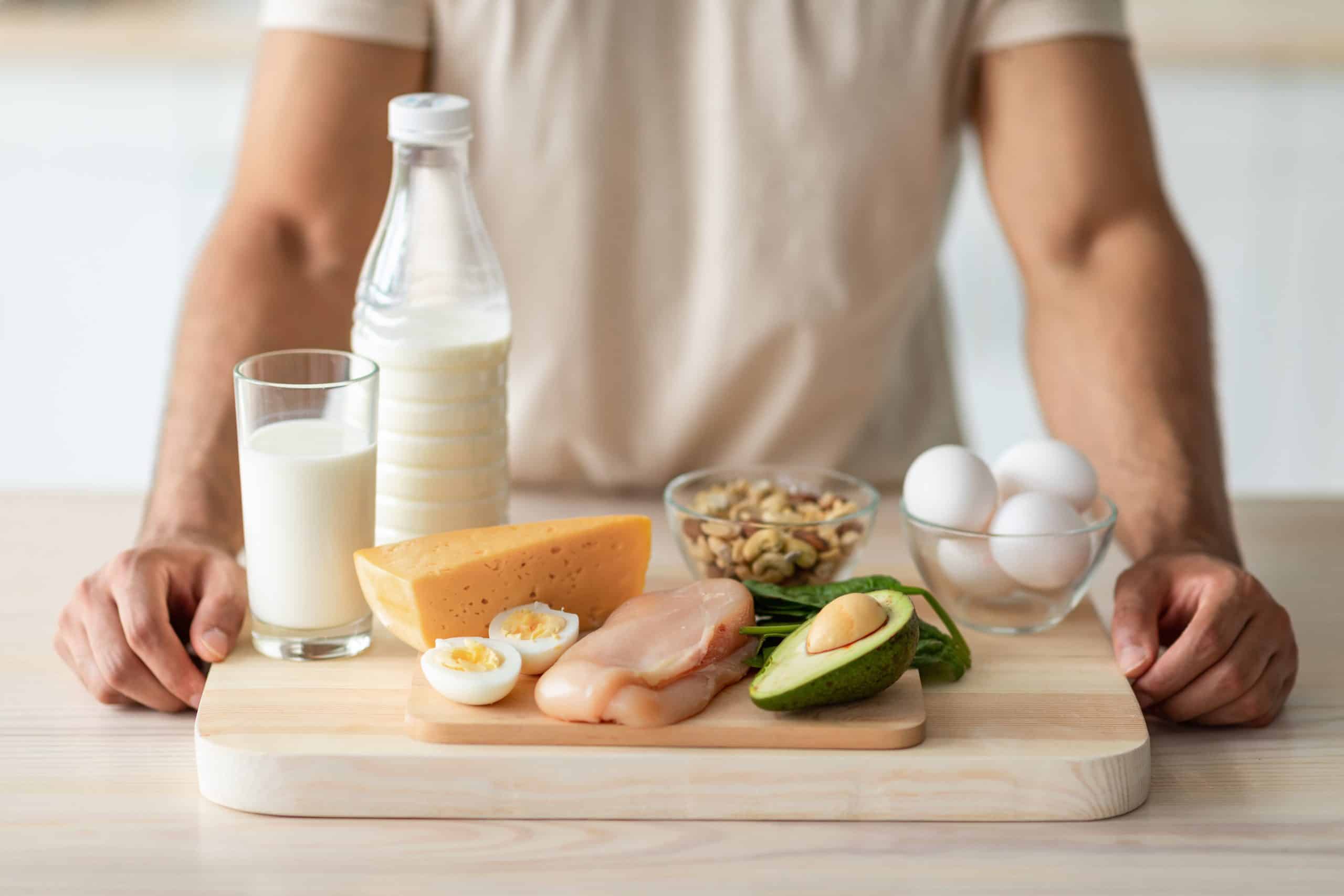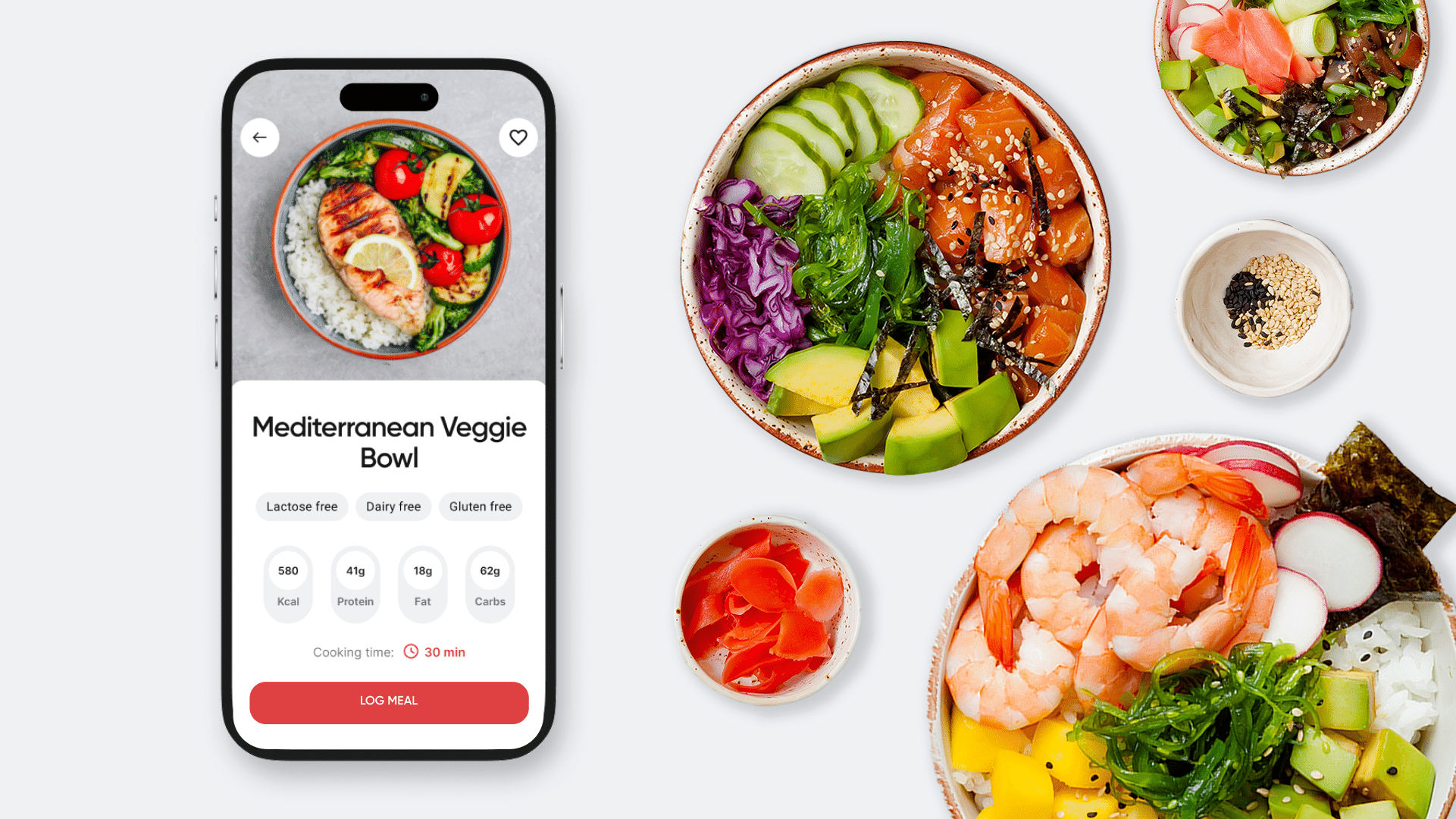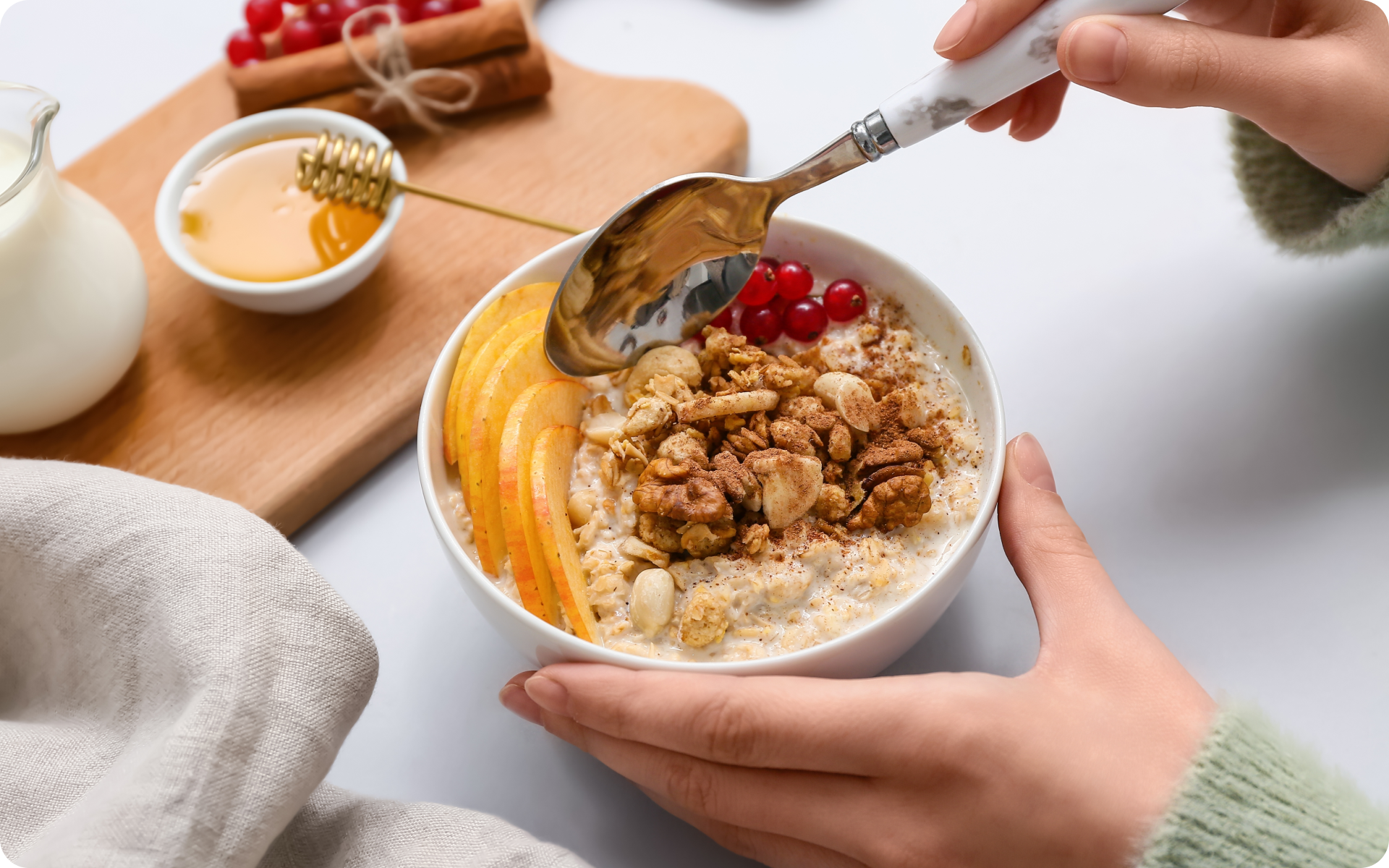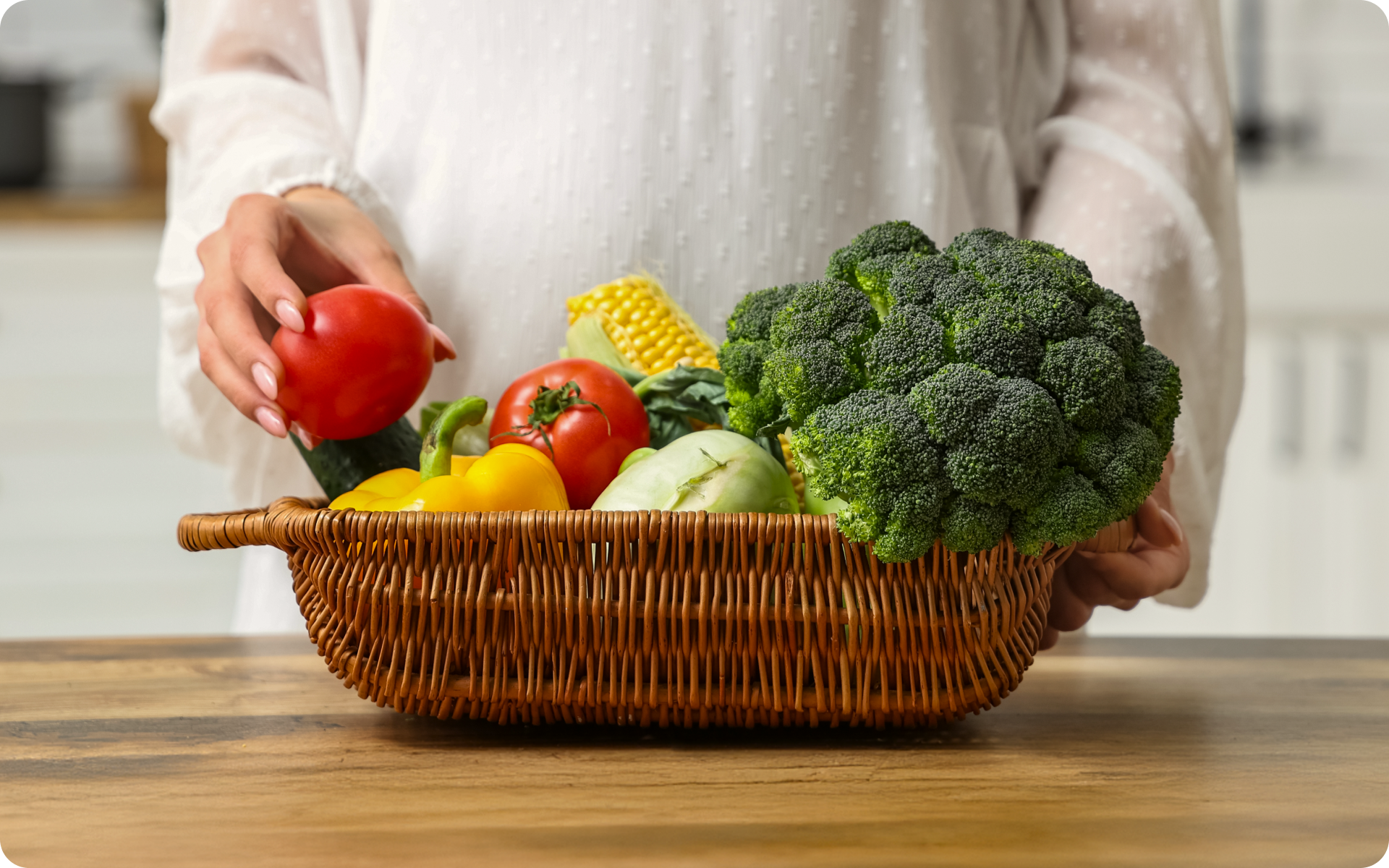You may need to gain weight for a variety of different reasons.
Perhaps you’re recovering from an illness or maybe you’re an athlete who’s aiming to build muscle mass for competitive advantage.
Your physician may recommend a high-calorie diet to help you with recovery or to achieve a specific body composition.
Bodybuilders and sports enthusiasts may also seek to increase their caloric intake as part of a strategy to enhance their performance and muscle growth.
The best way to accomplish this is not through empty calories and junk food but through a structured meal plan with a focus on whole, nutrient-dense foods.
Consuming 3,300 calories per day, distributed across well-planned meals, can significantly contribute to your weight gain goals while ensuring your body receives the vital nutrients it needs.
Here’s everything you need to know about creating a balanced 3,300-calorie meal plan aimed toward healthy weight gain, which will ensure that you fuel your body with the right foods at the right times.
Is 3,300 Calories a Day a Lot?
3,300 calories a day may seem like a lot, particularly if you’re used to consuming fewer calories. However, it’s important to keep in mind that this number represents a caloric intake that is tailored specifically for weight gain.
The average recommended daily caloric intake ranges from 2,000-2,500 calories for adult women and 2,500-3,000 calories for adult men (2). This means that a 3,300-calorie meal plan is approximately 1,000 calories more than the average intake and can be considered high in comparison.
Everyone’s caloric needs are different and depend on factors such as age, gender, activity level, and body composition (5). It’s always best to consult a healthcare professional or registered dietitian to determine your specific caloric needs before you start any meal plan.
Yanking yourself back in shape has never been so easy with our game-changing fitness app! Start transforming your life with BetterMe !
Can a Person Eat 3,000 Calories a Day?
A person can eat 3,000 calories a day, especially men who perform a high level of physical activity.
For the average person, 3,000 calories a day may be part of a weight gain meal plan, for various reasons:
Athletes and Bodybuilders
As previously mentioned, athletes and bodybuilders may need to consume a higher number of calories and optimize their nutrition plans to fuel their intense training regimen and build muscle mass (4) (6).
Depending on the individual’s body size and activity level, 3,000 calories may be sufficient for weight gain while supporting optimal performance.
Underweight Individuals
For those who are underweight or have a low body mass index (BMI), consuming more calories than the average recommended intake can help with weight gain. It’s essential to discuss this with a healthcare professional to ensure that the weight gain is healthy and sustainable.
Recovery from Illness
Some illnesses or medical conditions can cause unintentional weight loss, which makes it necessary to consume more calories for recovery and regaining lost weight. A 3,000-calorie meal plan can help with this process and help restore the body’s strength and health.
Other Factors
Other factors that may require a person to consume 3,000 calories a day for weight gain include a high metabolism, certain medications that affect appetite and weight, and hormone imbalances. Again, it’s essential that you consult a healthcare professional before you make significant changes to your diet.
Read more: The Vegetarian Intermittent Fasting Guide to Plant-Based Fasting and Feasting
How Many Carbs Is 3,300 Calories?
3,300 calories may have different macronutrient breakdowns, depending on the individual’s dietary preferences and needs. However, a general rule of thumb in bodybuilding is that a high-calorie diet should consist of 55-60% carbohydrates (9).
For a 3,300-calorie meal plan, this would equal approximately 1,650-1,980 calories from carbohydrates. With one gram of carbohydrate containing four calories (11), this would be equivalent to 412.5-495 grams of carbohydrates per day.
While you’re on this diet, you should consume complex carbohydrates from whole, unprocessed sources such as fruits, vegetables, whole grains, and legumes. These foods provide essential vitamins, minerals, and fiber, in addition to energy-dense carbs (7).
In our previous blog on Calorie Deficit Breakfasts, we mention the importance of incorporating protein and healthy fats into your meals to increase satiety and support muscle growth. This applies to a high-calorie meal plan too, as both nutrients are essential for overall health and weight gain.
3,300-Calorie Meal Plan Ideas
Meal planning has proven to be a helpful tool for achieving any dietary goal, including weight gain. Planning your meals in advance can be beneficial for avoiding impulsive food choices and ensuring balanced nutrient intake (10).
It also allows for efficient grocery shopping and meal prepping, which makes it easy to stick to your calorie goals throughout the week.
In our previous blog, Metabolic Diet Plan 13 Days, we emphasize the importance of varying your meals to avoid boredom and ensure adequate nutrient intake. The same applies to a meal plan for weight gain.
Here are some meal ideas you can incorporate into your 3,300-calorie meal plan:
3,300-Calorie Meal Plan Low-Carb
It can be challenging to gain weight on a low-carb diet, simply because carbohydrates provide the most efficient source of calories.
However, for those who prefer a lower carb intake, here’s a sample 3,300-calorie meal plan with a macronutrient breakdown (3):
Day 1
- Breakfast: Garlic egg omelet and vanilla walnut blueberry yogurt (821 calories)
- Lunch: Easy avocado with shrimp and sundried tomato and avocado chopped salad (1,132 calories)
- Snack: Apples with almond butter (291 calories)
- Dinner: Pan-fried steak with green salad (1,044 calories)
Macros: 3,289 calories, 67.4g net carbs, 262.5 g fat, 133 g protein, 57.9 g fiber
Day 2
- Breakfast: Tomato and egg scramble with 2 slices of cantaloupe (994 calories)
- Lunch: Pan-seared salmon with avocado remoulade and simple Thai pumpkin soup (752 calories)
- Snack: Cheesy meatballs with grilled asparagus (1,220 calories)
- Dinner: Peach raspberry smoothie (333 calories)
Macros: 3,299 calories, 55.2g net carbs, 241.4 g fat, 204.1 g protein, 24.8 g fiber
Day 3
- Breakfast: Bacon weave open sandwich with cottage cheese and raspberries (1,140 calories)
- Lunch: Keto Philly cheesesteak omelet with avocado and vegetable sandwich (889 calories)
- Snack: Cherry tomatoes with feta (306 calories)
- Dinner: Sauteed garlic spinach with chicken breast with fresh herbs (967 calories)
Macros: 3,303 calories, 68.7 g net carbs, 216.9 g, 240.8 g protein, 40.8 g fiber
Day 4
- Breakfast: Ham and asparagus frittata and bacon (789 calories)
- Lunch: Pecan-crusted tilapia with Caprese salad (1,144 calories)
- Snack: Strawberry almond trim smoothie (322 calories)
- Dinner: Cheesy-crust skillet pizza with green salad (1,047 calories)
Macros: 3,303 calories, 58.4 g net carbs, 225.8 g fat, 245.9 g protein, 19.3 g fiber
Day 5
- Breakfast: Sweet egg pancake with papaya flaxseed shake (915 calories)
- Lunch: Baked salmon and asparagus with gazpacho (798 calories)
- Snack: Black olives with Cheddar (577 calories)
- Supper: Sage and parsley chicken breast with easy sauteed spinach (1,008 calories)
Macros: 3,299 calories, 54.7 g net carbs, 239.8 g fat, 214.7 g protein, 21.4 g fiber
If you wish to cinch your waist, tone up your bat wings, blast away the muffin top – our fitness app was created to cater to all your needs! BetterMe won’t give excess weight a chance!
3,300-Calorie Meal Plan High-Protein (Paleo)
The paleo diet emphasizes whole, unprocessed foods and eliminates grains, legumes, and dairy. This high-protein meal plan follows the paleo guidelines while providing 3,300 calories (3):
Day 1
- Breakfast: Scrambled eggs with bacon and mushrooms and steamed callaloo (871 calories)
- Lunch: Raw broccoli salad and a handful of almonds (858 calories)
- Snack: Strawberry and spinach smoothie (302 calories)
- Dinner: Peppered steak with mushrooms and pomegranate salad (1,291 calories)
Macros: 3,321 calories, 175.3 g net carbs, 225.4 g fat, 122.7 g protein, 75.4 g fiber
Day 2
- Breakfast: Scrambled eggs with chorizo and apple and vegetable smoothie (856 calories)
- Lunch: Tuna with avocado and spinach tomato salad (1,057 calories)
- Snack: Almond butter with celery (325 calories)
- Dinner: Bacon-wrapped trout with rosemary and simple avocado cranberry salad (1,060 calories)
Macros: 3,298 calories, 96.9 g net carbs, 239 g fat, 161.4 g protein, 69 g fiber
Day 3
- Breakfast: Simple meat scramble with guacamole on tostada (998 calories)
- Lunch: Raw broccoli salad and an apple (788 calories)
- Snack: Strawberry and pear juice (322 calories)
- Dinner: Balsamic chicken and mushrooms with lettuce cucumber and walnut salad (1,192 calories)
Macros: 3,300 calories, 145.2 g net carbs, 179 g fat, 233.9 g protein, 68.4 g fiber
Day 4
- Breakfast: Almond flour pancakes with vegetable and apple smoothie (770 calories)
- Lunch: Tuna stuffed pepper with avocado and vegetable salad (820 calories)
- Snack: Strawberry and coconut milkshake (560 calories)
- Dinner: Seared salmon with watercress and warm orange dressing with baked kale chips (1,132 calories)
Macros: 3,282 calories, 181.5 g net carbs, 184.9 g fat, 185.3 g protein, 71 g fiber
Day 5
- Breakfast: Ham and egg mushroom cups with a banana coconut green smoothie (872 calories)
- Lunch: Peachy keen chicken with paleo steamed broccoli (906 calories)
- Snack: Green smoothie bowl (313 calories)
- Dinner: Simple steak with sauteed cabbage (1,217 calories)
Macros: 3,308 calories, 159.9 g net carbs, 202 g fat, 191.4 g protein, 47.7 g fiber
Read more: Do Vegetarians Eat Fish
3,300-Calorie Meal Plan Vegetarian
A vegetarian diet can also support weight gain if it is correctly planned to include adequate sources of protein, healthy fats, and complex carbohydrates. Here’s an example of a 3,300-calorie vegetarian meal plan (3):
Day 1
- Breakfast: Oatmeal with blueberries, sunflower seeds, and agave with raspberry mango sunrise smoothie (775 calories)
- Lunch: Skinny egg salad with steamed broccoli and tomato (774 calories)
- Snack: Tomato and hummus pocket sandwich (445 calories)
- Dinner: Pasta with red sauce and mozzarella and Swiss chard with olives (1,312 calories)
Macros: 3,307 calories, 338.6 g net carbs, 135.4 g fat, 154.4 g protein, 83.6 g fiber
Day 2
- Breakfast: Strawberry cheesecake pudding protein shake and rice cakes with banana and almond butter (758 calories)
- Lunch: Coconut green curry with soba and shaved fennel salad (780 calories)
- Snack: Greek yogurt with blueberries, walnuts, and honey (405 calories)
- Dinner: Parmesan herb spaghetti squash with avocado arugula salad (1,358 calories)
Macros: 3,301 calories, 240.1 g net carbs, 196.2 g fat, 127.8 g protein, 55.9 g fiber
Day 3
- Breakfast: Emmental cheese, tomato, and arugula omelet with almond butter banana toast (1,116 calories)
- Lunch: Red eye protein parfait and rice cake with peanut butter, pear, and honey (752 calories)
- Snack: Peanut butter berry protein smoothie (400 calories)
- Dinner: Gnocchi with mushrooms and butter with sautéed garlic spinach (1,034 calories)
Macros: 3,303 calories, 233.8 g net carbs, 174.9g fat, 189.5 g protein, 40.3 g fiber
Day 4
- Breakfast: Coffee and banana protein smoothie and toast with figs, ricotta, and honey (1,013 calories)
- Lunch: Maple vinaigrette couscous salad and chocolate milk whey protein shake (806 calories)
- Snack: Chia cottage cheese with blueberries (475 calories)
- Dinner: Sundried tomato and mushroom pasta with wilted spinach and corn salad (1,003 calories)
Macros: 3,297 calories, 412.9 g carbs, 81.9 g fat, 213.3 g protein, 52.3 g fiber
Day 5
- Breakfast: Blueberry maple syrup oatmeal with no-bake apple “cookies” (1,045 calories)
- Lunch: Post-workout banana protein smoothie with arugula pine nut salad (846 calories
- Snack: Peanut Butter, mango, and kale protein smoothie (333 calories)
- Dinner: Pineapple, black beans, and couscous with curried cabbage and carrot slaw (1,083 calories)
Macros: 3,306 calories, 347.2 g carbs, 124.1 g fat, 164.1 g protein, 73.3 g fiber
FAQs
How many meals is 3,500 calories a day?
3,500 calories a day can be as many (or as few) meals as you prefer. Some people find it more manageable to spread their caloric intake over 5-6 smaller meals/snacks throughout the day, while others may prefer 3 larger meals. It’s important to find a meal frequency that works best for your schedule and appetite.
It’s important to note that the quality of the meals and snacks determines how quickly you reach 3,500 calories a day.
For example, a large fast-food meal may contain 1,500-2,000 calories, while a balanced home-cooked meal with lean protein, complex carbs, and healthy fats may only provide around 600-800 calories.
While it may be tempting to opt for high-calorie, processed foods to reach your daily intake quickly, it’s important to prioritize nutrient-dense whole foods for overall health and well-being (8).
Check out our Kilocalories vs Calories blog to learn more about the difference between these terms.
Is 2,500 calories overeating?
2,500 calories may or may not be overeating, depending on your daily caloric needs and activity level. The recommended daily caloric intake for an average adult is approximately 2,000-2,500 calories, but this can vary significantly based on factors such as gender, age, height, weight, and activity level (2).
It’s best to consult a healthcare professional or registered dietitian to determine your specific caloric needs before deciding if 2,500 calories is overeating for you.
Is 1,400 calories overeating?
1,400 calories isn’t overeating; most individuals require more than this amount to meet their daily energy needs. Even when on a calorie deficit, it’s generally not recommended to consume less than 1,200 calories a day, as this can lead to nutrient deficiencies and health issues (2).
It’s best to consult a healthcare professional or registered dietitian before you make significant changes to your caloric intake.
Is 700 grams of carbs a day too much?
700 g of carbs a day may be too much for most individuals, as the recommended daily intake for carbohydrates is 225-325 grams. Consuming excessive amounts of carbohydrates can lead to weight gain and other health issues, such as insulin resistance and diabetes (12).
Active individuals or those with high caloric needs may require more carbohydrates, but it’s important to consult a healthcare professional for personalized recommendations.
Is burning 3,300 calories a day good?
Burning 3,300 calories daily is almost impossible for the average person as it would require intense physical activity for an extended period.
The recommended daily calorie burn through exercise is approximately 300-400 calories, with the remaining calories being burned through daily activities and bodily functions.
Is 3,300 calories good for bulking?
3,300 calories may be a good starting point for those who are looking to bulk up and gain weight. However, it’s important to adjust your caloric intake as required based on your progress and body composition goals.
It’s recommended to increase your caloric intake gradually rather than jumping straight to a high number like 3,300 calories, as this can lead to excessive weight gain and an unhealthy relationship with food.
Again, consulting a healthcare professional or registered dietitian can help determine the appropriate caloric intake for your specific needs and goals. You should keep in mind that proper strength training and an overall balanced diet are essential components of any successful bulk (1).
The Bottom Line
Achieving weight gain goals can be challenging, but with proper planning and a balanced, nutrient-dense diet, it’s possible.
The key to success is finding the right caloric intake for your body and incorporating whole, unprocessed foods into your meals.
Consulting a healthcare professional or registered dietitian is always recommended before making significant dietary changes.
Remember, it’s not just about reaching a specific calorie number; it’s also about fueling your body with the right foods at the right times to support overall health and well-being.
DISCLAIMER:
This article is intended for general informational purposes only and does not serve to address individual circumstances. It is not a substitute for professional advice or help and should not be relied on for making any kind of decision-making. Any action taken as a direct or indirect result of the information in this article is entirely at your own risk and is your sole responsibility.
BetterMe, its content staff, and its medical advisors accept no responsibility for inaccuracies, errors, misstatements, inconsistencies, or omissions and specifically disclaim any liability, loss or risk, personal, professional or otherwise, which may be incurred as a consequence, directly or indirectly, of the use and/or application of any content.
You should always seek the advice of your physician or other qualified health provider with any questions you may have regarding a medical condition or your specific situation. Never disregard professional medical advice or delay seeking it because of BetterMe content. If you suspect or think you may have a medical emergency, call your doctor.
SOURCES
- Building muscle: nutrition to maximize bulk and strength adaptations to resistance exercise training (2008, tandfonline.com)
- Calories (2022, ncbi.nlm.nih.gov)
- Eat This Much (n.d., eatthismuch.com)
- Effects of Different Dietary Energy Intake Following Resistance Training on Muscle Mass and Body Fat in Bodybuilders: A Pilot Study (2019, ncbi.nlm.nih.gov)
- Energy – Recommended Dietary Allowances (1989, ncbi.nlm.nih.gov)
- Fueling for Performance (2018, ncbi.nlm.nih.gov)
- Importance of Carbohydrate Quality: What Does It Mean and How to Measure It? (2022, ncbi.nlm.nih.gov)
- Increased Intake of Foods with High Nutrient Density Can Help to Break the Intergenerational Cycle of Malnutrition and Obesity (2015, ncbi.nlm.nih.gov)
- Macronutrient considerations for the sport of bodybuilding (2004, pubmed.ncbi.nlm.nih.gov)
- Meal planning is associated with food variety, diet quality and body weight status in a large sample of French adults (2017, biomedcentral.com)
- Physiology, Carbohydrates (2023, ncbi.nlm.nih.gov)
- The Carbohydrate-Insulin Model of Obesity: Beyond ‘Calories In, Calories Out’ (2019, ncbi.nlm.nih.gov)










